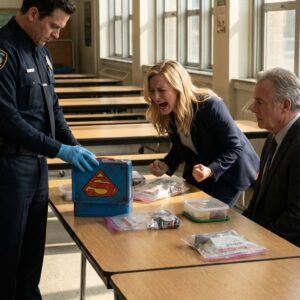I adore my daughter-in-law like she’s my own. That’s why, a week before Christmas, I texted my son from the housewares aisle and asked what gift would make her light up. He replied with a smirk I could hear through the phone: “Get her cookware—maybe she’ll finally cook right.”
I stood there holding a ribboned box of copper pans and felt my face heat. I typed back, “Are you serious?” He sent a laughing emoji. I bought the set anyway, but not for the reason he thought.
On Christmas morning, the living room was a soft mess of paper and glittering bows. The kids were shrieking over remote-control dinosaurs, the dog was sneaking tinsel, and I handed the box to Mila last because she always opens gifts last, carefully, as if not to startle the moment. She peeled the tape, lifted the lid, and froze. The room went quiet in a way I’ve only felt in hospitals and churches.
My son turned a shade I remembered from the time he broke our neighbor’s window. “Mom. That’s not funny.”
I didn’t smile. “It isn’t a joke. You said she needed it.”
He couldn’t meet my eyes. Mila closed the lid gently, like covering a sleeping child. “Thank you,” she said, and set it aside. She started helping the kids with their toys and didn’t say another word about it. He didn’t either.
Later, when the last guest had left and the house smelled like nutmeg and pine, she found me in the kitchen holding two mugs of tea. “Thank you for the gift,” she said, voice soft. “But… why cookware?”
I could have lied. I didn’t. “Your husband thought you’d love it.”
Her laugh was short and brittle. “Figures.”
“You’re a good cook,” I said, taking her hand. “I’ve eaten your risotto. He was being a brat.”
Something unspooled in her face—a small relief, or maybe a strand of trust. Then she let out a breath that sounded like weeks. “He’s been like this lately. He calls them jokes, but they land like… jabs. I brush it off, and then I go to bed and my chest hurts. I’m so tired.”
I had always thought they were golden together—two capable people in a neat house with chore charts and bedtime stories. I hadn’t noticed the way she braced herself when he walked into a room, the way her smile was something she put on before anyone else woke up.
“He used to admire me,” she said. “He liked that I had a big job. Now it’s like every choice is a test I’m failing.”
“People show you who they are when they think you won’t leave,” I said. It came out before I could edit it.
She smiled, but it was small and sad. “I don’t want to leave. I want him to stop aiming for me.”
The next day I stayed longer than planned. I wanted to see the things you don’t see at holidays—the Tuesday habits. They were there, sharp as thumbtacks. She plated lunch and he said, “Easy on the salt this time, yeah?” She mentioned a promotion track and he rolled his eyes, half-turning away. She asked if he could fold the towels and he said, “You’re better at it.”
It was a familiar tone. I had heard it in other kitchens, other decades: men making themselves taller by pressing down. I didn’t raise a son to do that. Or maybe I did, and I hadn’t noticed.
I asked him to take a walk. No preamble. We circled the block passing inflatable snowmen and I said, “You’re being cruel to her.”
He scoffed. “Mom, they’re jokes.”
“They’re only jokes if both people laugh.”
“She used to be fun,” he said. “Now everything’s heavy.”
“Maybe that’s because she’s carrying your sarcasm on top of your kids and your life.” I stopped walking so he had to stop, too. “Put it down.”
He stared at the curb. “You don’t get it.”
“I do. I remember your father before he learned to use his inside voice. I remember how small a woman can become when a man chips at her joy with a butter knife every day.”
He was quiet a long time. Then he said, “Okay,” which didn’t mean anything yet.
I didn’t wait for him to change. I started propping Mila up wherever I could—an afternoon with the kids so she could nap, a note on the counter that said, “Your soup tasted like love,” a text after her big meeting: Proud of you. She glowed in the way plants glow when someone finally opens the blinds.
Three days into the new year he walked in with grocery-store roses, the plastic sleeve still crinkling. He handed them to her like they were heavier than they looked. “I’ve been a jerk,” he said, eyes on the floor. “I want to try again. Will you sit with me?”
I went upstairs and closed the door. That night she came to my room with damp lashes and a smile that trembled. “He apologized,” she whispered. “Like really apologized. Not the kind with ‘but’ attached.”
“Good,” I said. “Now see if he keeps apologizing with his calendar, his hands, and his mouth closed.”
Things started to shift. Not grand gestures, not fireworks—just small corrections. He said thank you for dinner. He asked about her day and listened. He loaded the dishwasher without announcing it like a charity gala. He kissed the kids’ hair and told them their mom was smart. I let hope walk around the house but didn’t ask it to sit down.
Then came her March birthday. He planned a dinner, invited her people, and made a speech that made her cry and me pretend I had something in my eye. After the cake, while we were stacking plates, her friend Cami said casually, “I’m glad he came to his senses. After last year, I wasn’t sure.”
I turned. “After what last year?”
Cami’s mouth snapped shut. “Nothing, just… at the office party, he was—” She waved a hand. “It’s not my story.”
That night, under too-bright kitchen lights, I asked Mila carefully. She stared at her tea for a long time. “He didn’t cheat,” she said finally. “Not with his body. But there was a woman at work. Texts. Flirting. He swore it stopped. He apologized. I decided not to throw a marriage away over the ghost of a mistake.”
It hurt that she didn’t tell me, and it humbled me that she thought protecting my opinion of my son was her job. “I will always love him,” I said. “And I will not pretend when he’s wrong. You deserved better.”
“I think he knows that,” she said. “He’s trying.”
The next morning I asked my son to meet me at a coffee shop. We sat by the window where the sun makes everyone look kind. I told him what I knew. He didn’t argue. “It didn’t go far,” he said quickly, as if shortening the distance mattered.
“It went far enough,” I said. “You pushed your wife to the edge and then asked her to pretend the wind wasn’t blowing.”
He swallowed. “I know. I’m… ashamed.”
“Good. Don’t build a house there, but visit often.” I tapped the table. “I don’t want to hear you’re trying. I want to see it.”
He showed us. He went to therapy. He and Mila signed up for a workshop where people sit in a circle and speak without eye-rolling. He started writing her notes on Sundays: three things he admired, one memory, one promise. He let the kids see him do dishes and say sorry.
Then the universe did what it always does when you stop leaning so hard—it rebalanced. That summer he lost his job in a wave of corporate downsizing. Panic made a temporary home in their pantry. The same week, Mila’s boss resigned and Mila was offered the role. Big promotion. Bigger raise. Overnight, the woman who had been told to “cook right” was the breadwinner.
She didn’t spike the football. She held the family steady, paid the bills, and told him to breathe. He took over afternoons and sticky hands and permission slips. He learned the math of three loads a day and the choreography of bedtime. I walked in one evening to find him in an apron, following one of her old recipes, tongue between his teeth the way he did as a boy coloring inside the lines.
“I’m trying to cook right,” he said sheepishly.
“It’s not about cooking right,” I told him, kissing his cheek. “It’s about treating her right.”
He nodded. “Both,” he said. “Probably both.”
By December, our house felt like a place people could exhale. We gathered again, cocoa steaming, carols whispering from the speaker. When Mila opened her present from him, the room got quiet again—but the holy kind. He’d made her a cookbook. Not store-bought. Bound in soft leather, filled with her recipes and photos of their messy attempts and notes in the margins from him and the kids. At the bottom of each page, a love note: “Mom’s pancakes fix everything.” “This soup is what cozy tastes like.” “Thank you for feeding us when you were the one who needed feeding.”
She cried. We all did.
Watching her thumb those pages felt like watching a wound knit itself closed. Not a scarless heal—those don’t exist—but a strong one, a beautiful one. From a petty jab about cookware to a year of apologies, effort, and a book of gratitude. From ego to humility. From a woman swallowing her hurt to a man learning how not to cause it.
I learned something too. Love isn’t pretending your child is always right. It’s standing next to the person they vowed to love and saying, “I see you. You’re not crazy. You deserve care.” It’s holding up a mirror without smashing it over anyone’s head.
If you’re tempted to joke at the expense of the person who keeps your life stitched together—don’t. If you’ve been swallowing jabs and calling it patience—stop. Ask for better. And if you’re lucky enough to be given a second chance, prove you deserve it with your hands, your calendar, your mouth closed, and your heart open.
The cookware still lives in their kitchen. She uses it. He cleans it. It turns out the gift wasn’t the pans. It was the lesson that came wrapped around them: respect is the ingredient that makes everything taste like love.





